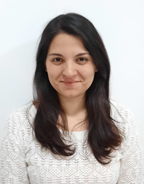Need Help?
11 May 2023
Interview with Dr. Roberta De Robbio—Winner of the Energies 2023 Travel Award
We are pleased to announce the winner of the Energies 2023 Travel Award—Dr. Roberta De Robbio.

Name: Dr. Roberta De Robbio
Affiliation: Department of Industrial Engineering, University of Naples “Federico II”, Italy
Research Interests: CFD; internal combustion engines; gas turbines; dual fuel; optical diagnostic; hydrogen; hybrid vehicles
We would like to thank the award committee for selecting two winners from a large number of exceptional candidates, one of them being Dr. Roberta De Robbio. We will continue to reward scholars with the Travel Award to express our acknowledgment of their support for our journal. We wish them every success in their careers.
The following is a short interview with Dr. Roberta De Robbio:
1. Can you briefly introduce yourself to our readers and tell us a little bit about your fields of interest?
I graduated in Mechanical Engineering for Energy and Environment in 2016 and defended my Ph.D. thesis in 2020 at the University of Naples Federico II. After two years at the Institute of Sciences and Technologies for Sustainable Energy and Mobility of the National Research Council, I am currently a post-doctoral researcher at University Federico II, and recently, I won the selection as a researcher (type A) at the same University.
The main topic of the research activity is combustion analysis and modeling by means of computational fluid dynamics (CFD) tools. To this end, I have conducted parallel studies on two different types of thermal plants, say: a micro gas turbine fueled with biofuels and hydrogen, and diesel engines supplied with natural gas and hydrogen in dual fuel mode. I have tested, implemented, and utilized several models and kinetic mechanisms in different codes. Each process, such as turbulence, injection, vaporization, and oxidation, has been examined with the aim to evaluate pollutants’ emissions and to reduce their formation.
2. Which research topics do you think will be of particular interest to the research community in the coming years?
I think the climate change emergency, environment preservation and all the related issues will still be central topics in the next years. Indeed, it is a problem that affects everyone and all sectors of the economy. In addition, clean energy from renewable sources is the object of my studies, and I am doing my best to give my contribution, not only as a researcher.
3. Can you briefly describe the key to a happy laboratory life?
I believe that the key to a happy laboratory life is respect and communication between the members of the staff. I believe that to achieve the desired goals in a team, everyone should cooperate, and when a difficulty is encountered, they should not be afraid to ask for help.
4. What is your opinion of the open access model of publishing?
In my opinion, open access publishing can be a fundamental tool to spread knowledge not only among researchers, but also among students and people who are employed or simply interested in a determined field. It also offers the chance to be informed of the latest findings to the researchers of institutions with low financial possibilities, mitigating the gap in education levels in the international scientific community.
5. As the winner of this award, is there something you would like to express?
Firstly, I want to express my gratitude to Energies for giving me this award, being chosen is an important acknowledgment from the scientific community. I feel honored and more motivated to give my best.
In my opinion, the sharing of ideas is one of the principles on which the spreading of knowledge and the development of scientific research are based; indeed, for researchers, especially the young ones, the participation in international conferences represents a valuable opportunity for growth by meeting other peers coming from all over the world. However, travel expenses can be a significant obstacle for most of them. For this reason, I would like to express my appreciation to Energies for the generosity and the support provided to young scholars and research itself as well.

